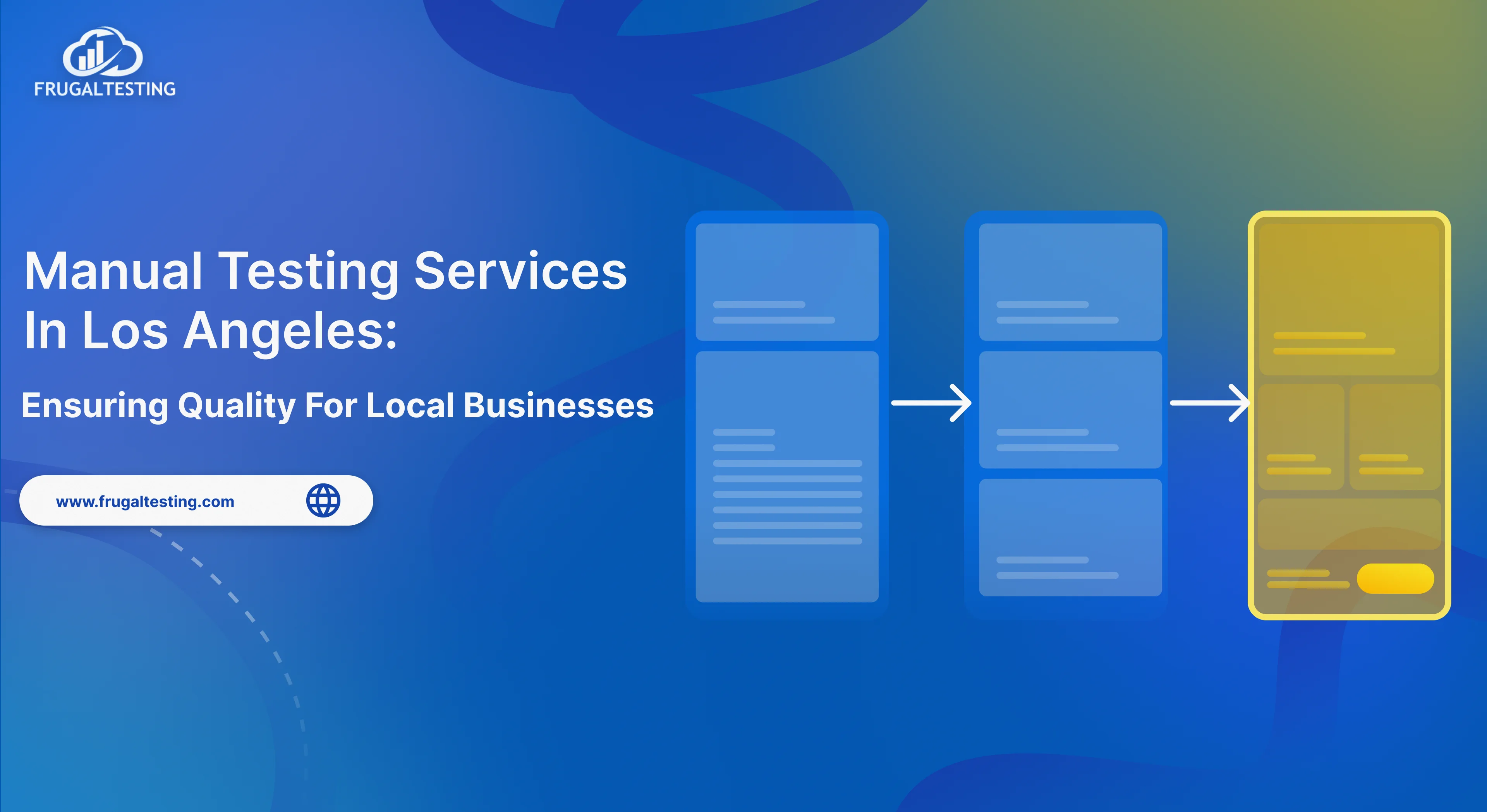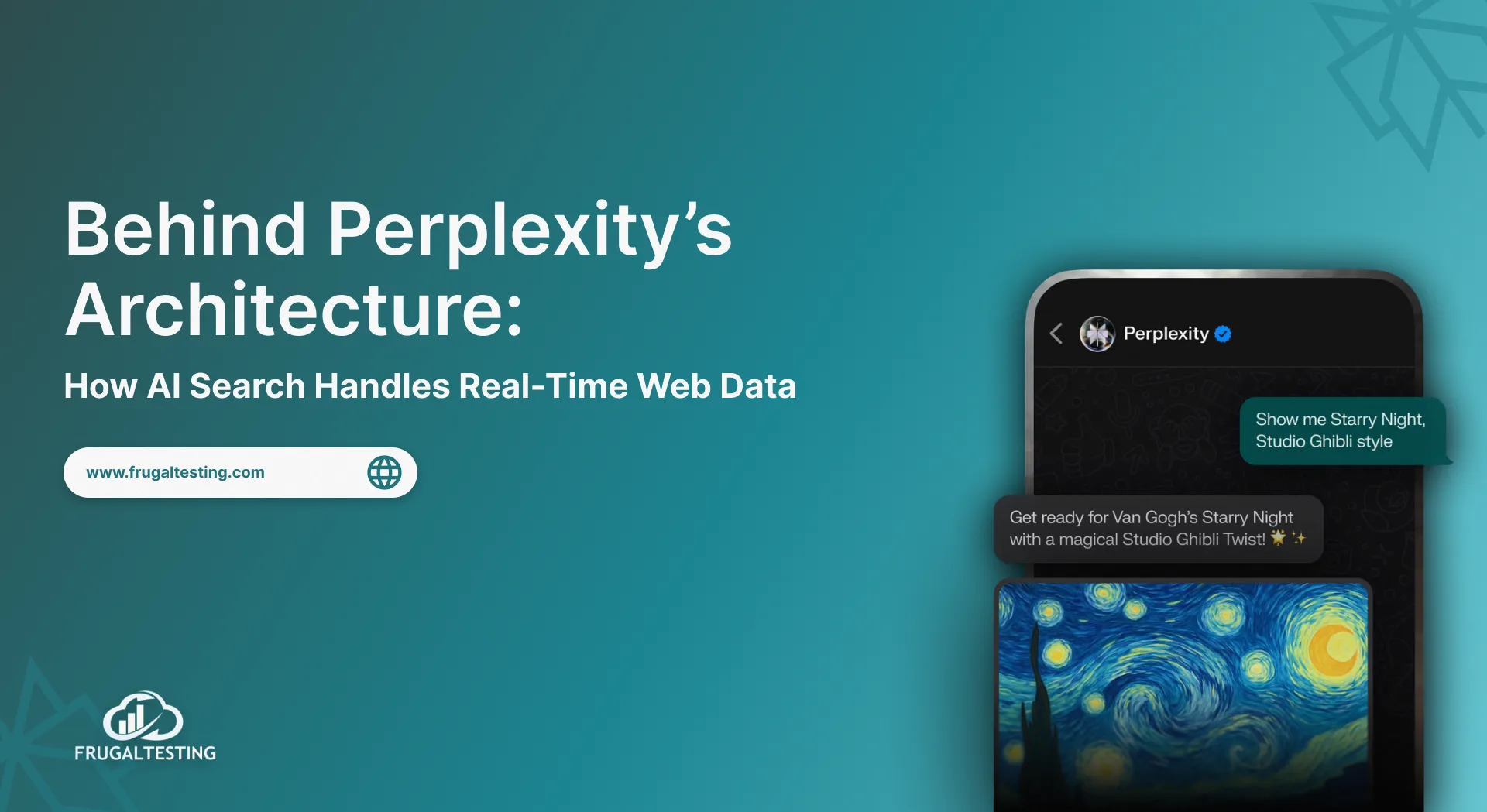Blockchain technology is reshaping industries, and businesses in New York City are prioritizing reliable blockchain testing services to secure their digital assets. Whether working with the Bitcoin blockchain, Ethereum blockchain, or Solana blockchain, effective software testing ensures strong performance, security, and functionality.
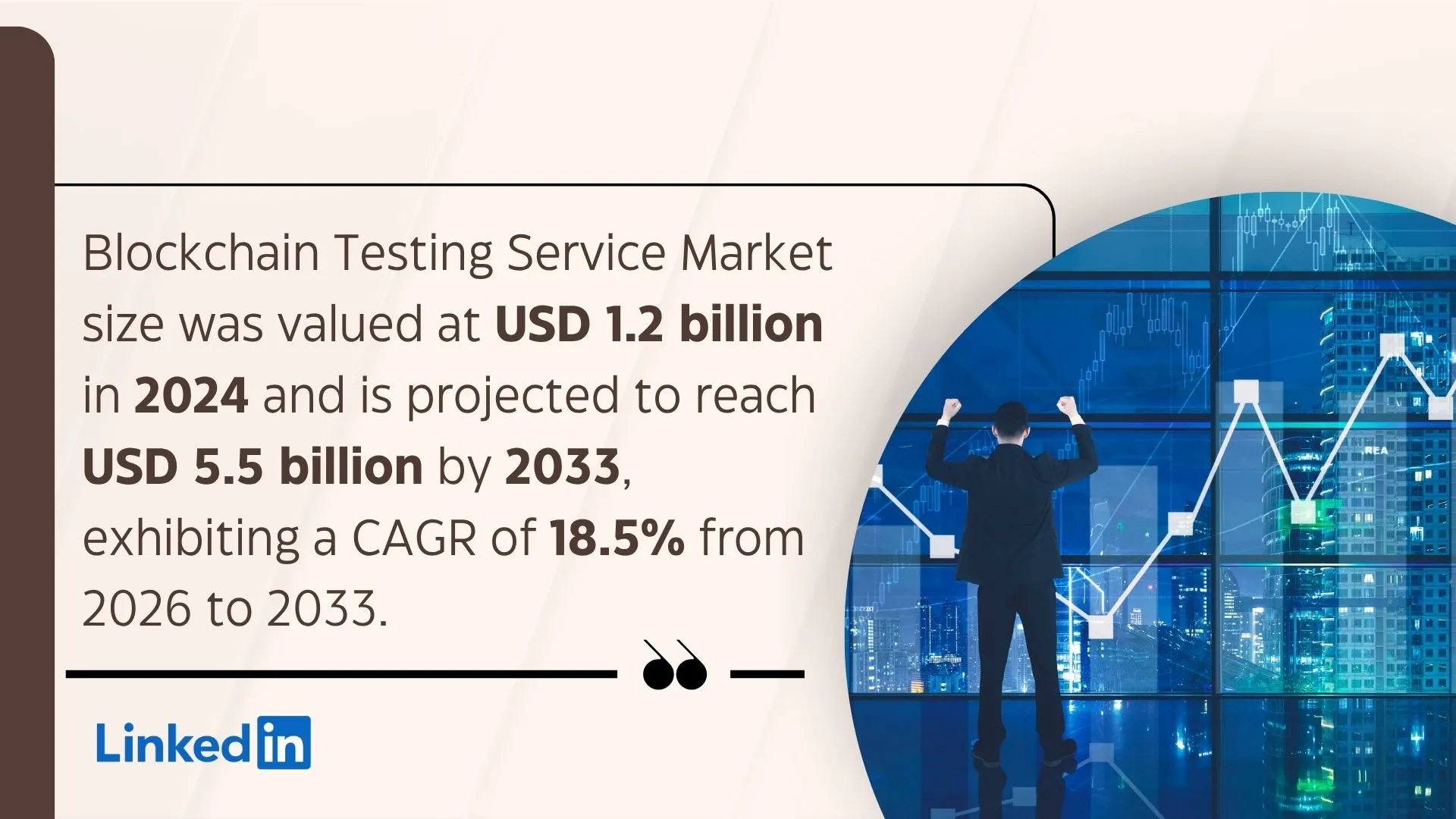
Services such as security penetration testing, dynamic application security testing, and functional software testing are essential for protecting every blockchain transaction. With advanced software testing tools and targeted strategies such as website performance testing and user testing software, NYC teams are building trust in every block, one test at a time.
💡 What’s next? Keep scrolling to find out
🚀 Blockchain Testing Basics: Importance of QA in decentralized apps
🚀 Service Types & Challenges: Details NYC’s offerings and testing hurdles
🚀 Core Testing Layers: Includes functional, performance, and penetration testing
🚀 Top Tools & Companies: Highlights testing tools and firms like Frugal Testing and Peiko
🚀 NYC Edge & Takeaways: Shows local testing benefits and final insights for businesses
What is Blockchain Testing and Why It Matters
Blockchain testing is the process of validating decentralized apps, nodes, smart contracts, and consensus algorithms to ensure that blockchain-based systems function as expected under real-world conditions. As the demand for blockchain development grows, testing becomes crucial to minimize risks, ensure scalability, and verify security protocols across complex environments.
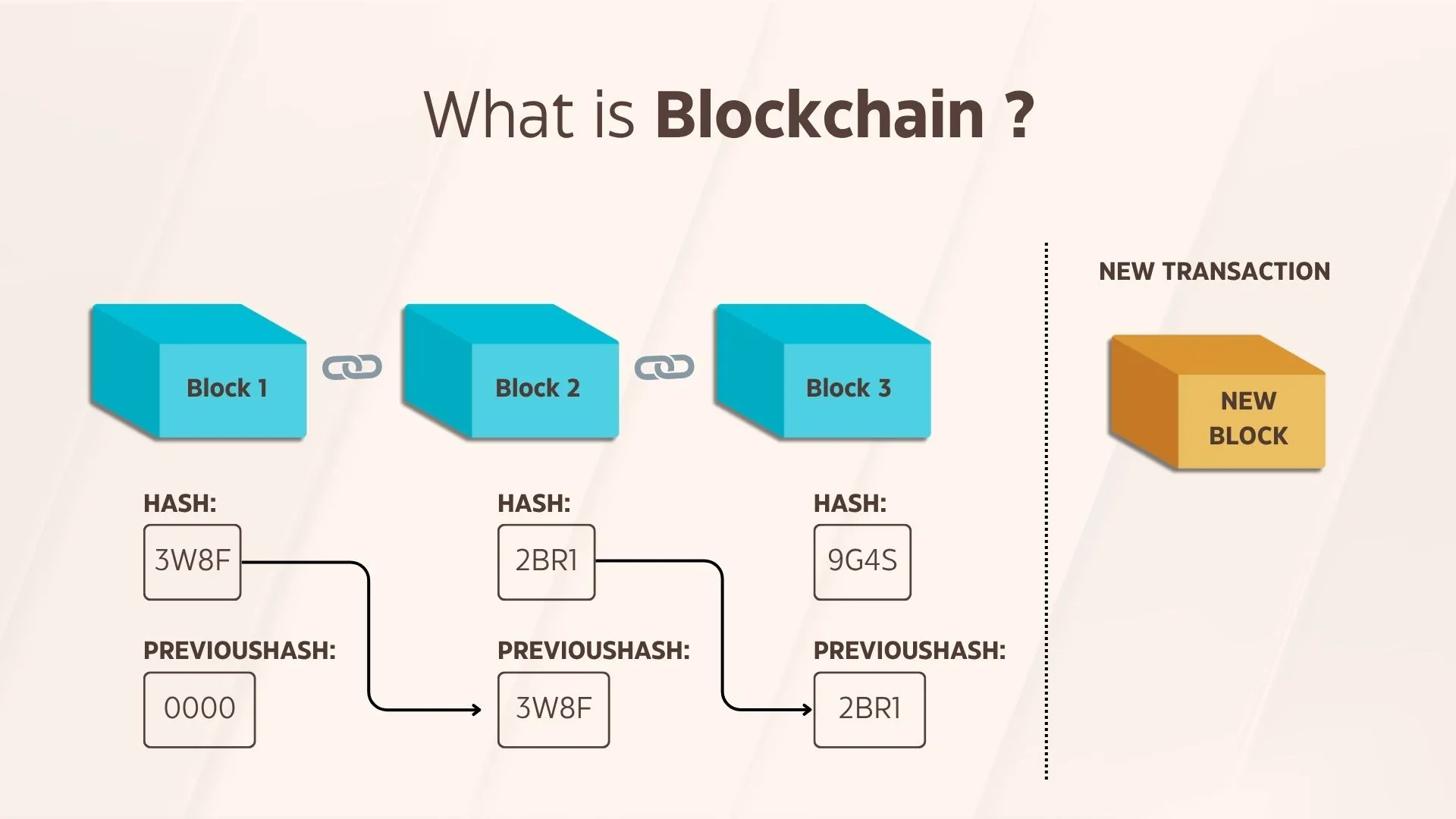
- Ensures Smart Contract Accuracy: Prevents logic errors during deployment by utilizing software testing tools integrated with blockchain protocols.
- Boosts System Confidence: Builds user trust by verifying the reliability of blockchain transactions across distributed nodes.
- Improves Network Performance: Enhances responsiveness through website performance testing tools in decentralized setups.
- Enables Secure Application Delivery: Integrates software security testing for validating access control in public and private networks.
- Supports Real-Time Analytics: Enables developers to analyze results using advanced user testing software to improve usability.
- Optimizes Test Coverage: Covers both backend protocols and UI with split testing software for blockchain apps.
Types of Blockchain Testing Services Offered in NYC
New York City has become a hub for innovative blockchain solutions, offering specialized testing services to ensure performance, security, and functionality. These services help organizations confidently deploy applications on networks like the Ethereum blockchain, Bitcoin blockchain, and the Solana blockchain, ensuring seamless transactions and robust performance.
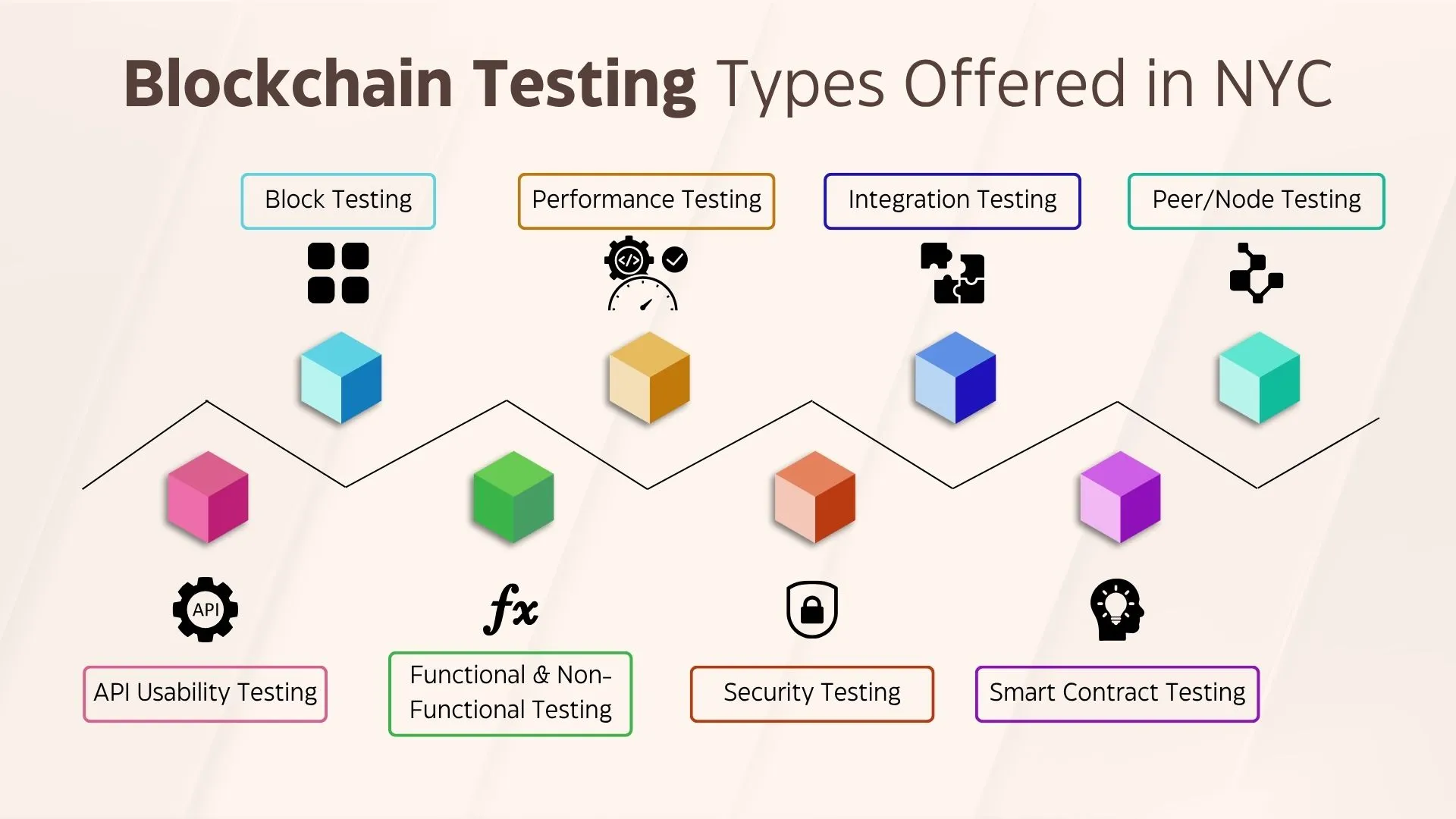
- Functional Testing Services: Focuses on validating smart contract execution and verifying logic using structured functional testing in software testing approaches.
- Security Testing Services: Detect vulnerabilities across nodes using advanced security penetration testing and penetration testing in cyber security practices.
- Performance Testing Services: Ensures blockchain scalability and stability with tools like k6 performance testing tailored for web performance testing.
- Dynamic Application Security Testing: Offers continuous monitoring of applications with real-time threat detection across the blockchain explorer layer.
- Functional Testing Types: Includes regression, integration, and UI testing aligned with functional software testing techniques specific to blockchain environments.
Common Challenges in Blockchain Testing
Blockchain testing presents unique complexities due to its decentralized architecture and immutable nature. Testing teams must overcome both technical and functional obstacles to ensure reliable, secure, and scalable blockchain solutions.
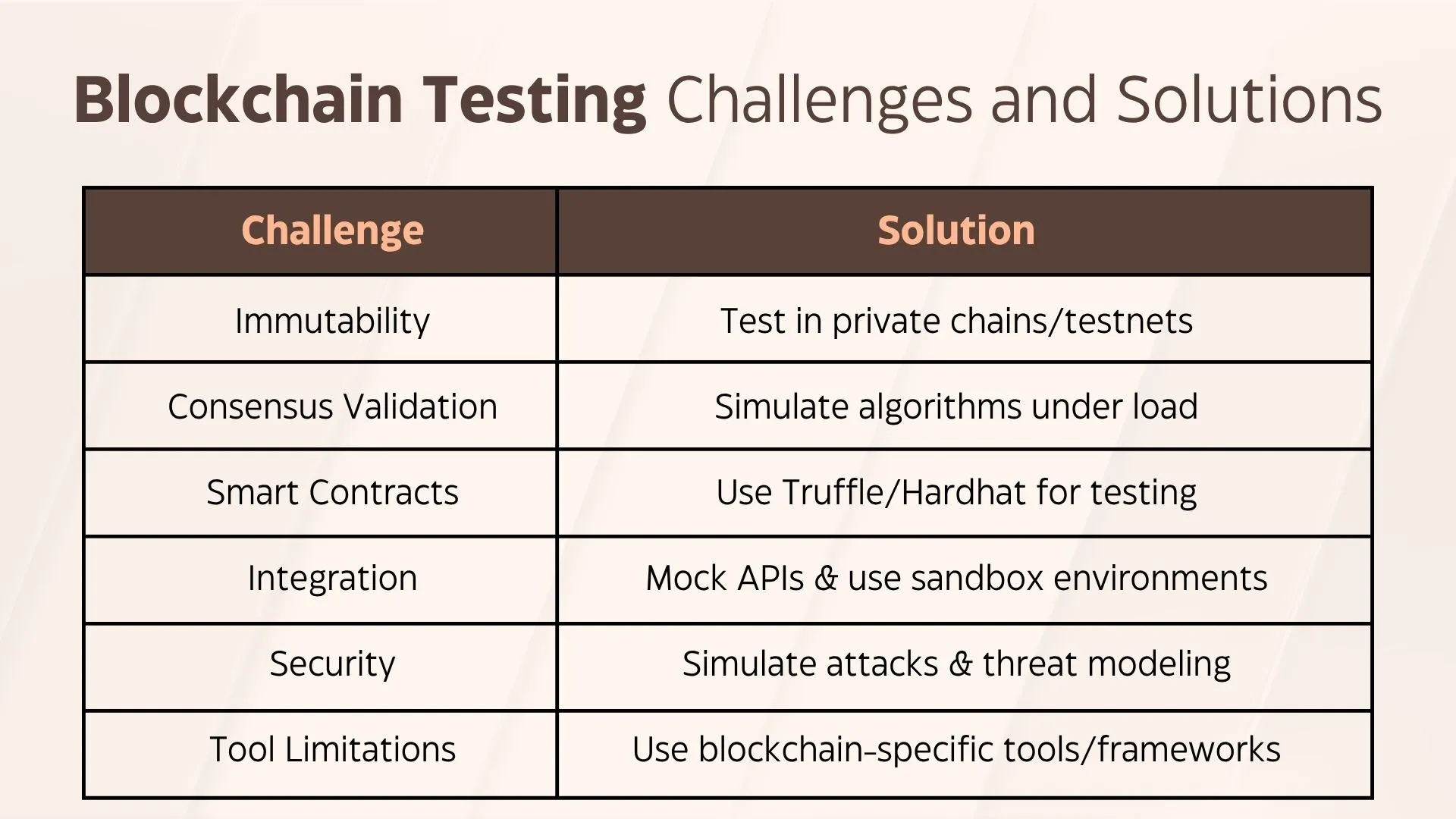
- Data Immutability Issues:
Once a blockchain transaction is validated, it cannot be altered, making rollback strategies ineffective.
Solution: Use sandbox environments and mock networks to simulate blockchain states without affecting actual data. - Consensus Mechanism Validation:
Validating mechanisms like Proof of Work or Proof of Stake require complex setup and test coverage.
Solution: Implement automated node simulations and testnet environments tailored to each consensus model. - Smart Contract Accuracy:
Bugs in smart contracts lead to permanent results, so accuracy is critical.
Solution: Use static code analysis tools like Slither, and apply structured functional testing in software testing phases. - Integration Complexity:
Integrating blockchain with legacy systems and APIs adds complexity to testing.
Solution: Use API mocking tools and test containers to validate data flow and compatibility without live dependencies. - Security Threats:
Blockchain is vulnerable to unique threats like 51% attacks and DDoS attempts.
Solution: Conduct continuous threat modeling, penetration testing in cybersecurity practices, and use automated vulnerability scanners. - Tool Limitations:
Traditional tools like Selenium or JMeter fall short for decentralized systems.
Solution: Use blockchain-specific tools such as MythX, Truffle, Hardhat, and Chainlink testing frameworks.
How Blockchain Testing Differs from Traditional Software Testing
Unlike traditional software systems, blockchain operates on a decentralized, tamper-proof ledger. This introduces new complexities in validation, verification, and performance analysis. Here's how blockchain testing and traditional software testing compare:
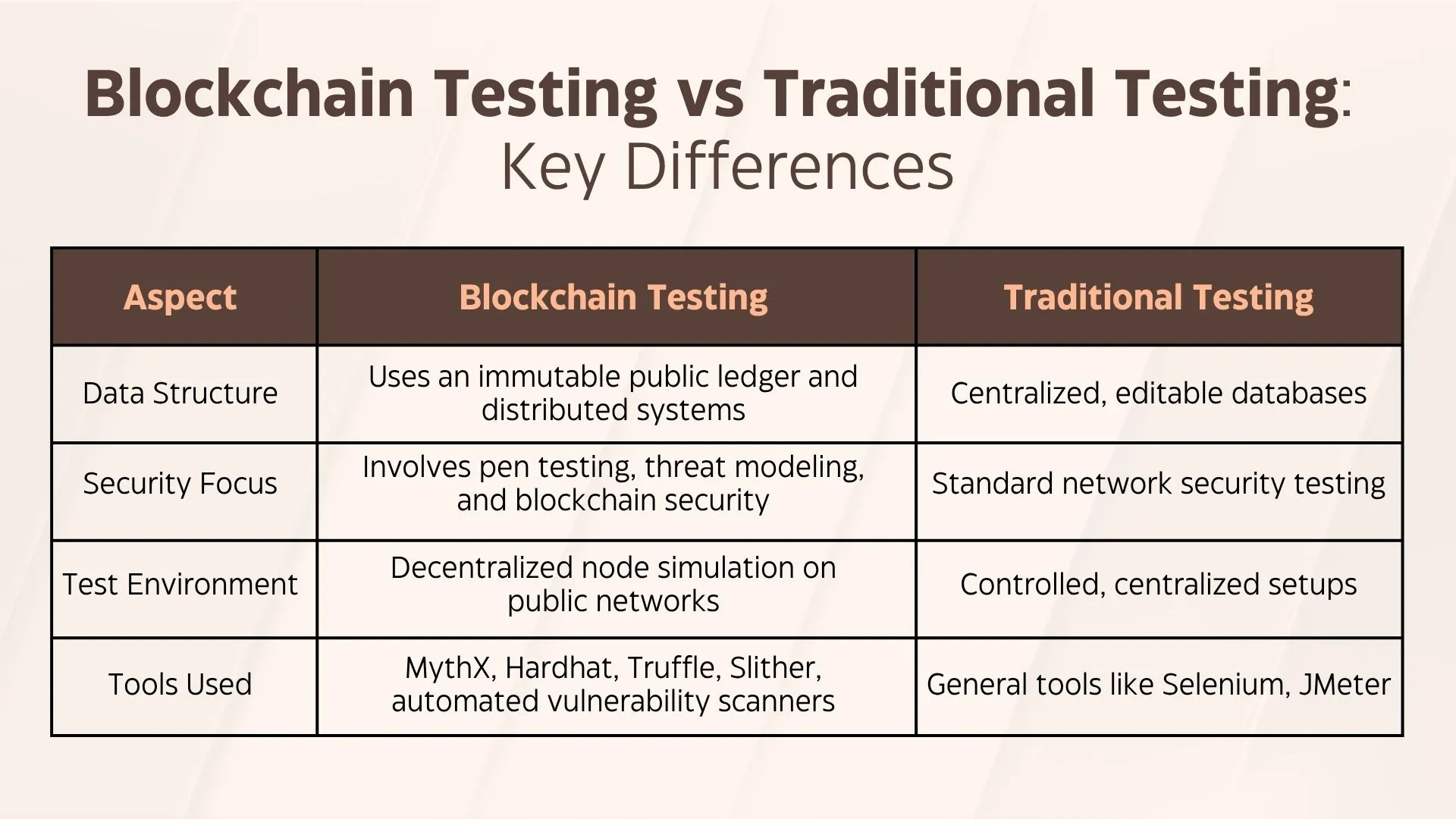
- Consensus Protocol Verification: Blockchain testing must validate consensus algorithms (e.g., PoW, PoS) to ensure correct block validation across nodes.
- Gas Usage Efficiency: Blockchain tests often analyze smart contract execution costs (gas fees), which are not applicable in traditional testing.
- On-Chain vs Off-Chain Testing: Testing must cover both blockchain-stored data (on-chain) and external systems (off-chain), requiring hybrid strategies.
- Fork Handling & Chain Reorgs: Blockchain testers simulate chain forks and reorganizations to validate data consistency a non-issue in traditional systems.
- Block Propagation Speed: Blockchain performance tests focus on block confirmation times and transaction finality, unlike response time in traditional systems.
- Real Asset Risk: Failures in blockchain apps can cause direct financial losses, demanding more rigorous, preventive testing compared to typical web or app testing.
- Public Network Constraints: Many blockchain apps are deployed on public networks where rollback isn't possible, requiring flawless pre-deployment testing.
Functional Testing for Blockchain Applications
Functional testing ensures that blockchain-based systems meet business requirements and behave as expected across various conditions. This testing validates that all functions from wallet transactions to smart contract logic operate smoothly within the decentralized ecosystem.
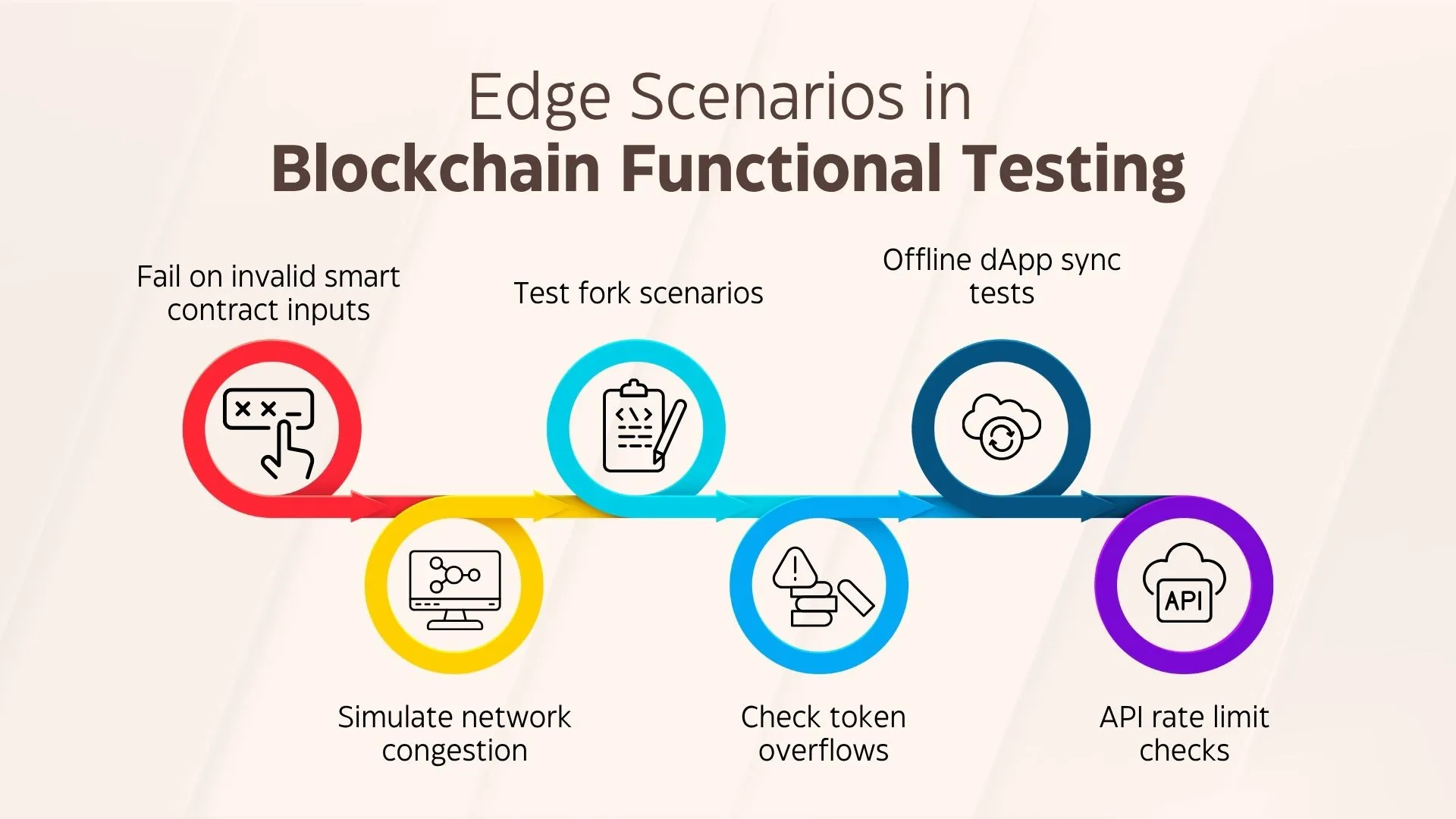
- Smart contract validation: Verifies if deployed contracts execute correctly, ensuring trust in digital agreements and protecting crypto assets.
- Token transaction accuracy: Ensures token development flows, such as minting, burning, and transfers, function properly on Ethereum token and other blockchain standards.
- Consensus rule verification: Checks implementation of consensus mechanisms like Proof of Work in public blockchain networks for accuracy in data propagation.
- dApps interaction testing: Validates frontend-backend integration in decentralized applications for seamless user experience.
- Blockchain API testing: Confirms correct behavior of APIs for wallet, exchange, and NFT marketplace operations using tools that align with blockchain architecture design.
- Data consistency checks: Ensures information recorded on the distributed ledger remains immutable and accurately synced across nodes.
Security Testing to Prevent Blockchain Vulnerabilities
Security testing in blockchain focuses on identifying and mitigating risks unique to decentralized systems. It ensures the resilience of smart contracts, infrastructure, and integrations against internal flaws and external cyber threats.
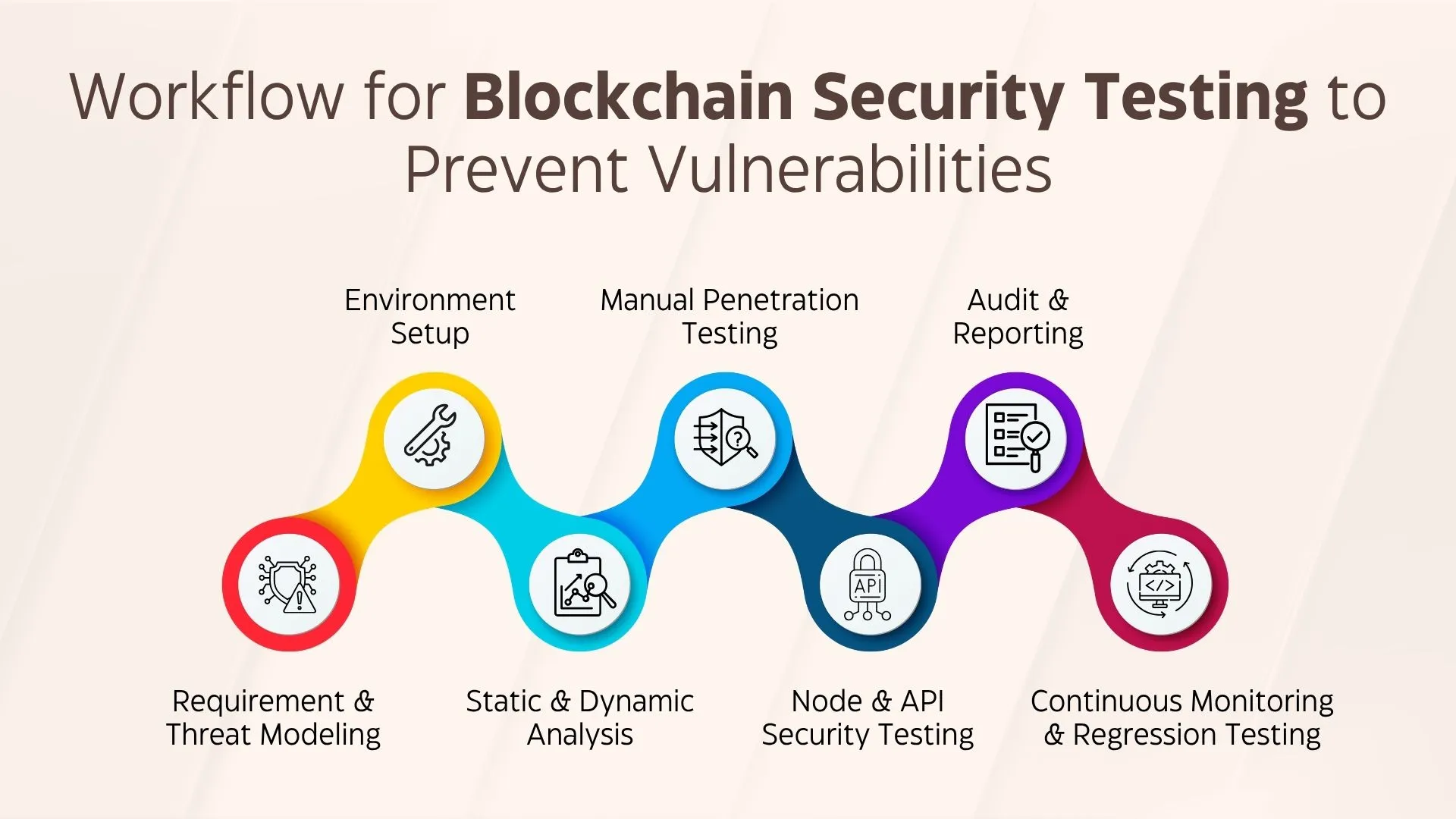
- Manual penetration testing: Simulates real-world attacks like 51% attack and DDoS attack to uncover critical system vulnerabilities across distributed ledger technologies.
- Threat modeling: Assesses potential risks in blockchain integration, analyzing the impact of compromised nodes or flawed token development logic.
- Attack surface analysis: Identifies weak points in blockchain infrastructure, including smart contract interfaces, consensus layers, and Web3 security gaps.
- Use of automated vulnerability scanners: Tools like MythX and Slither detect flaws in smart contracts before deployment to safeguard blockchain integrity.
- Security audits for dApps: NFT development, metaverse apps, and cryptocurrency exchange platforms undergo deep Blockchain Security reviews to preserve user trust.
- Simulation-based risk management: Evaluates how decentralized systems respond under extreme conditions without disrupting real-time environments.
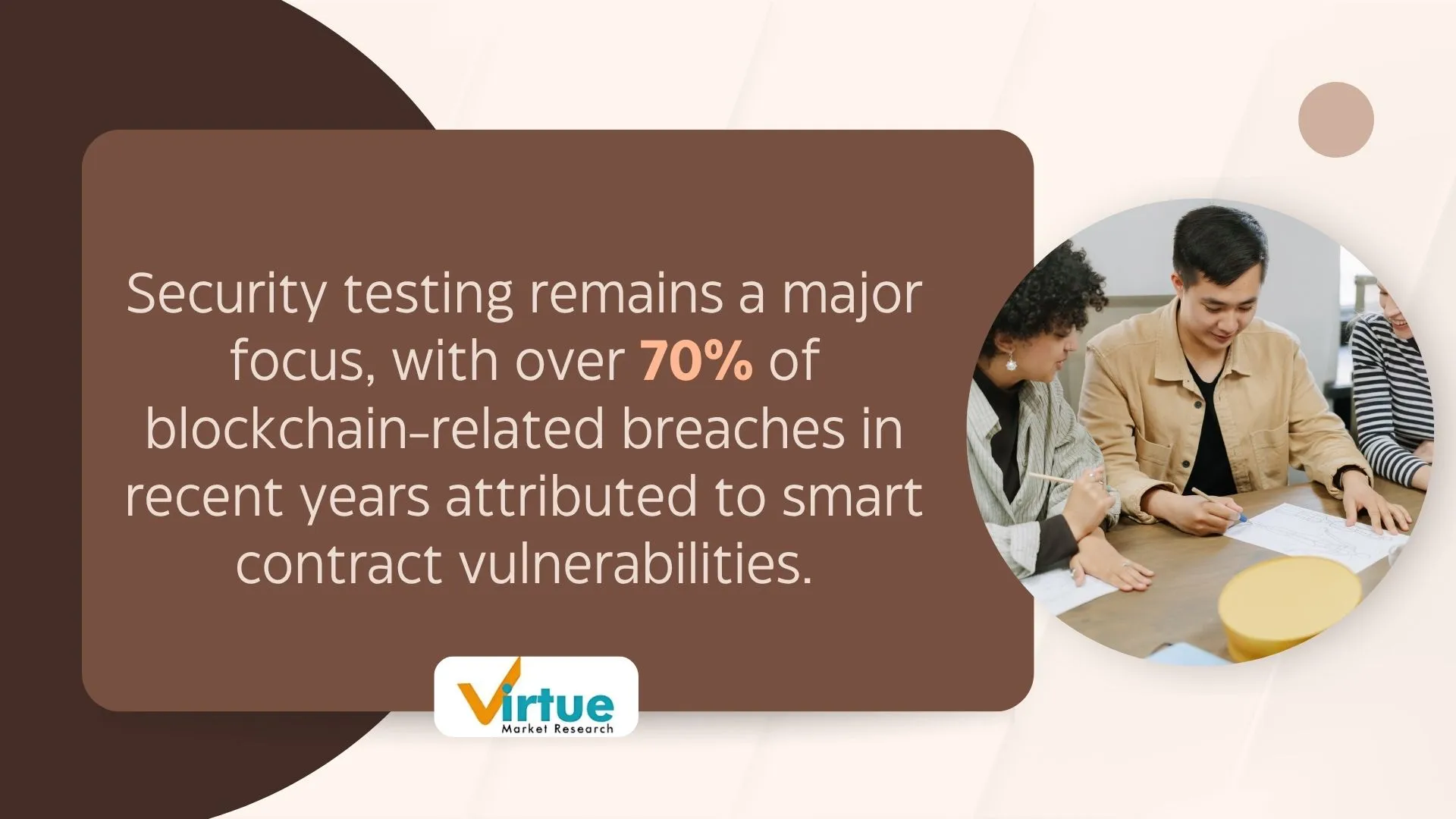
Performance Testing for Blockchain Networks
Performance testing ensures blockchain networks can scale efficiently and handle increased load without degrading speed or reliability. It’s crucial for applications like digital asset management, NFT marketplace, and cryptocurrency exchange platforms, where performance directly impacts user experience.
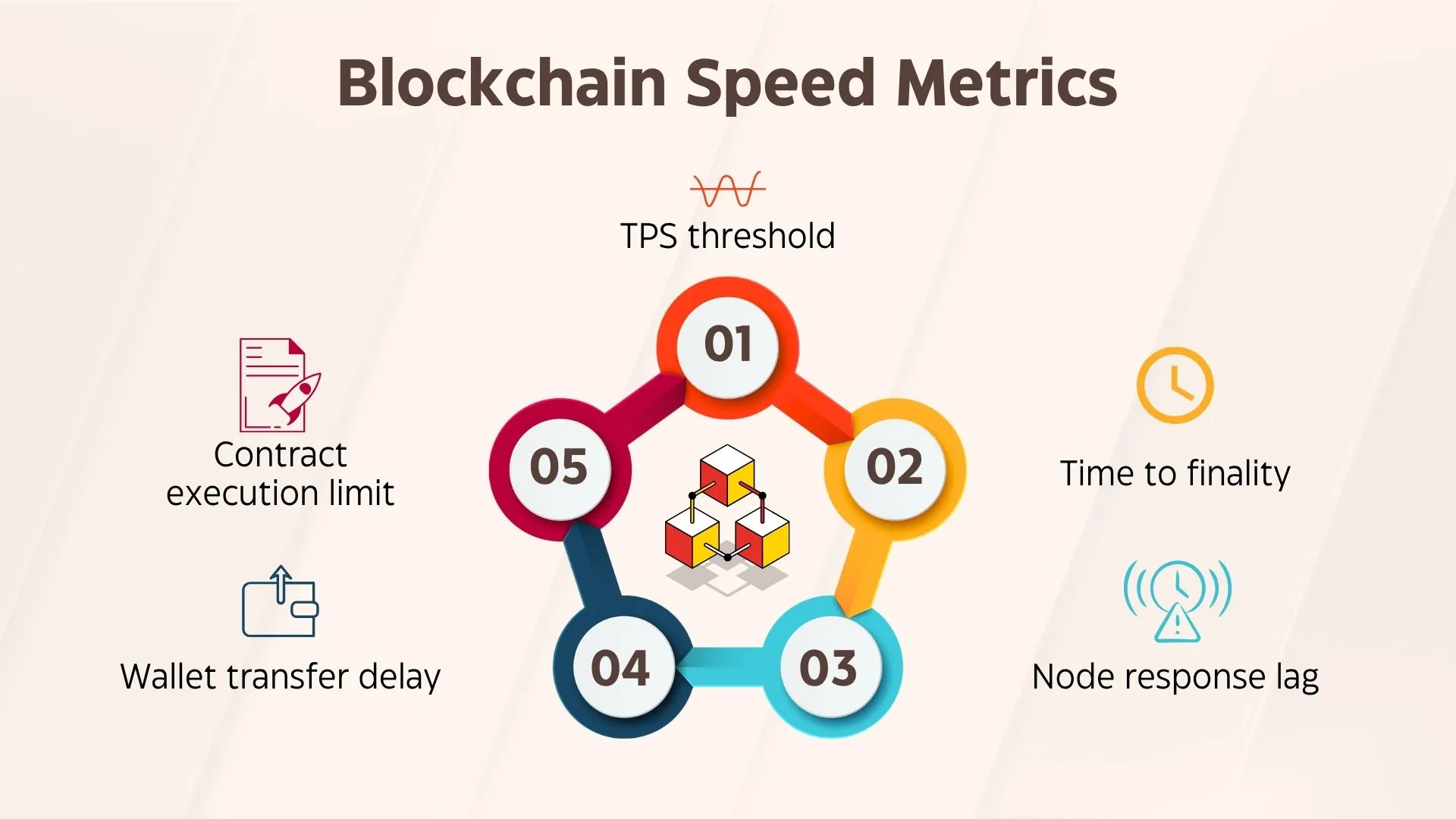
- Throughput and latency analysis: Measures transaction speed, block confirmation time, and node synchronization in public blockchain networks.
- Load testing with distributed nodes: Simulates heavy traffic to evaluate how well the blockchain architecture design handles network congestion.
- Smart contract execution speed: Validates how quickly contracts perform in dApps development and token development workflows.
- Stress testing: Pushes blockchain development services beyond normal limits to identify performance bottlenecks in distributed ledger system operations.
- Benchmarking under consensus mechanisms: Tests Proof of Work and other algorithms to assess performance under different blockchain infrastructure conditions using cloud computing setups.
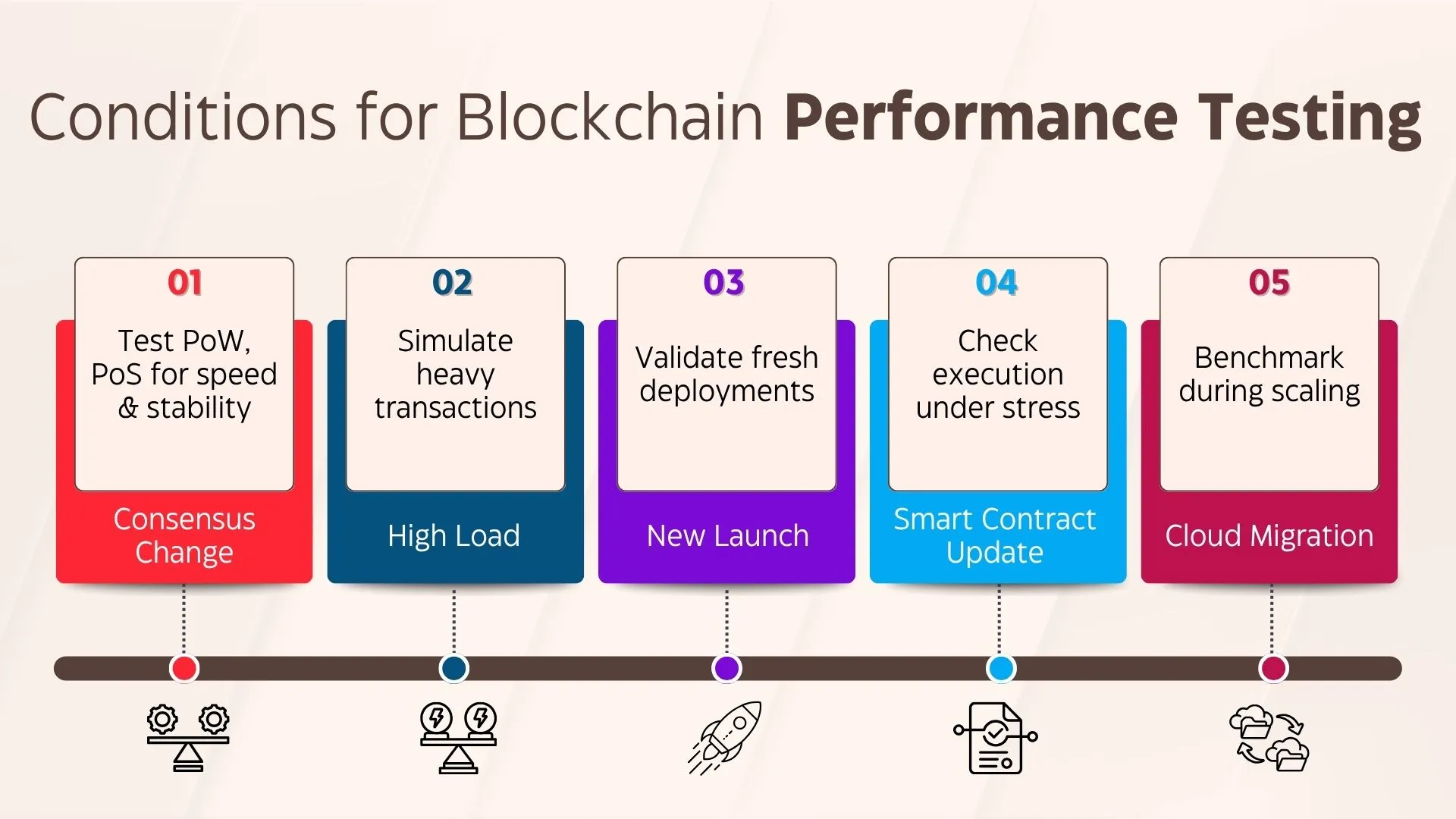
- Integration impact checks: Evaluates how blockchain integration affects overall app speed in web development and mobile application development scenarios.
Top Blockchain Testing Tools Used by NYC QA Teams
Blockchain QA teams in NYC rely on advanced testing tools to ensure decentralized applications and smart contracts are reliable, secure, and scalable. These tools support blockchain integrity, risk management, and improve software assurance for public blockchain networks.
- Ethereum Tester: A Python-based testing library designed for unit testing Ethereum-based applications and simulating chain behavior in test environments.
- Truffle Suite: Assists in dApps development with built-in testing frameworks for smart contracts and Ethereum token validation.
- Ganache: A local blockchain simulator used to test contract deployment and transaction behavior without affecting the mainnet.
- MythX: Performs automated vulnerability scanners to detect critical issues in smart contracts and supports threat modeling.
- Hyperledger Caliper: Measures blockchain performance metrics such as transaction throughput and latency for blockchain infrastructure benchmarking.
- Hardhat: Offers advanced debugging tools, script automation, and plugin integrations for secure blockchain development services.
- Remix IDE: A browser-based tool for smart contract testing and manual penetration testing to strengthen blockchain security during NFT development and Metaverse apps.
Top Blockchain Testing Companies in New York City
New York City hosts some of the world’s leading blockchain testing companies, known for their expertise in secure, scalable decentralized application validation. These firms offer end-to-end blockchain QA services, from smart contract audits to performance testing. Their focus on cutting-edge tools and deep knowledge of blockchain architecture design ensures enterprise-grade reliability and trust.
Frugal Testing
Frugal Testing is a leading QA testing company specializing in blockchain, Web3, and decentralized technologies. Known for its affordable yet robust test strategies, it serves enterprises across FinTech, DeFi, and crypto markets.
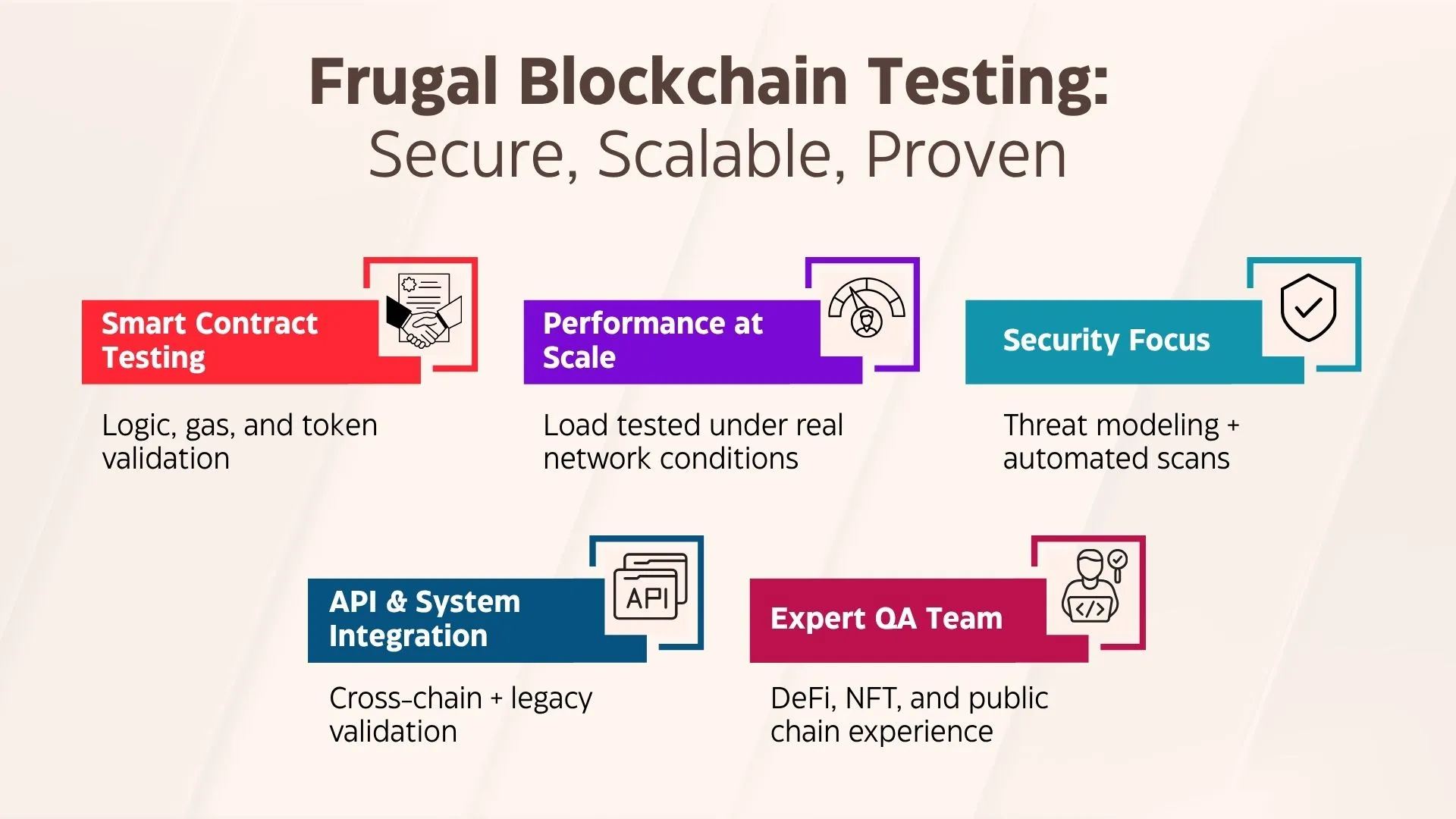
- Smart Contract Audits: Delivers in-depth audits to identify logic flaws, gas inefficiencies, and security vulnerabilities in smart contracts.
- Blockchain Penetration Testing: Simulates cyberattacks to assess blockchain resilience and uncover security loopholes.
- NFT Testing Solutions: Validates NFT minting, trading, and metadata integrity for marketplaces and gaming platforms.
- DeFi Protocol Testing: Ensures the safety and accuracy of decentralized finance platforms under multiple conditions.
- Web3 QA Services: Provides end-to-end testing for dApps, wallets, and DAO governance mechanisms across public and private chains.
Unicsoft
Unicsoft is a blockchain testing service provider that offers tailored quality assurance for startups and enterprises adopting Web3, DeFi, and AI-driven platforms. With a strong presence in New York City, Unicsoft emphasizes secure and scalable blockchain solutions.
- Blockchain Quality Assurance: Delivers testing frameworks for public and private blockchains, focusing on end-to-end system validation.
- Crypto Wallet Testing: Ensures secure transaction flows, seed phrase encryption, and multi-device compatibility.
- AI & Blockchain Integration Testing: Validates AI-powered blockchain solutions with stress testing and real-world simulations.
- Tokenomics Testing Services: Evaluates token issuance logic, staking mechanisms, and supply control in smart contracts.
- Custom Blockchain QA Consulting: Offers consulting support for blockchain startups, including test plan creation and DevOps integration.
Peiko
Peiko is a blockchain development and testing company known for delivering robust, scalable Web3 solutions and decentralized applications (dApps). Based in New York City, Peiko combines engineering precision with agile testing services across DeFi, NFT platforms, and Layer 2 solutions.
- Web3 Application Testing: Covers functionality, UI/UX validation, and smart contract behavior for Web3 apps.
- DeFi Protocol Testing: Verifies lending protocols, liquidity pool logic, and interest rate calculations.
- Cross-Chain Compatibility Checks: Tests interoperability across multiple blockchain networks, including Ethereum and BNB Chain.
- Load & Stress Testing: Simulates real-world traffic spikes to test performance bottlenecks in blockchain systems.
- Decentralized Storage Validation: Ensures smooth integration with IPFS and other decentralized file systems.
Infuy
Infuy is a blockchain development and QA company known for delivering high-quality testing solutions tailored for smart contracts and decentralized applications. Based in New York, the company brings technical depth and strategic alignment to blockchain projects.
- Smart Contract Validation: Offers thorough testing for Ethereum and Solidity-based smart contracts across multiple environments.
- Node Synchronization Testing: Evaluates consistency and performance across decentralized nodes to maintain blockchain reliability.
- Custom Blockchain QA Frameworks: Builds tailor-made test cases and frameworks for public and private blockchains.
- Software Penetration Testing: Integrates advanced attack simulations to identify and resolve blockchain vulnerabilities.
- Use of Security Testing Tools: Leverages specialized blockchain QA tools like Tenderly and MythX to automate bug detection and improve audit accuracy.
Encyphers
Encyphers is a cybersecurity and software testing company based in New York, offering robust blockchain testing services to safeguard decentralized ecosystems. Their focus is on proactive threat mitigation and system resilience.
- Smart Contract Auditing: Performs deep analysis of contract logic to detect bugs, security loopholes, and code inefficiencies.
- Software Penetration Testing: Simulates real-world attack scenarios on blockchain networks to uncover critical vulnerabilities.
- Security Testing Tools: Utilizes tools like Hardhat, Slither, and OpenZeppelin to automate security checks across blockchain infrastructures.
- API & Integration Testing: Ensures seamless interaction between blockchain platforms and third-party APIs under secure protocols.
- End-to-End Blockchain QA: Covers testing across consensus protocols, data immutability, and transaction validation for enterprise-grade dApps.
Benefits of Local Blockchain Testing Services in NYC
New York City is home to an ecosystem of advanced blockchain developers, testers, and security professionals. Choosing local blockchain testing services in NYC offers startups and enterprises unique technical and strategic advantages.
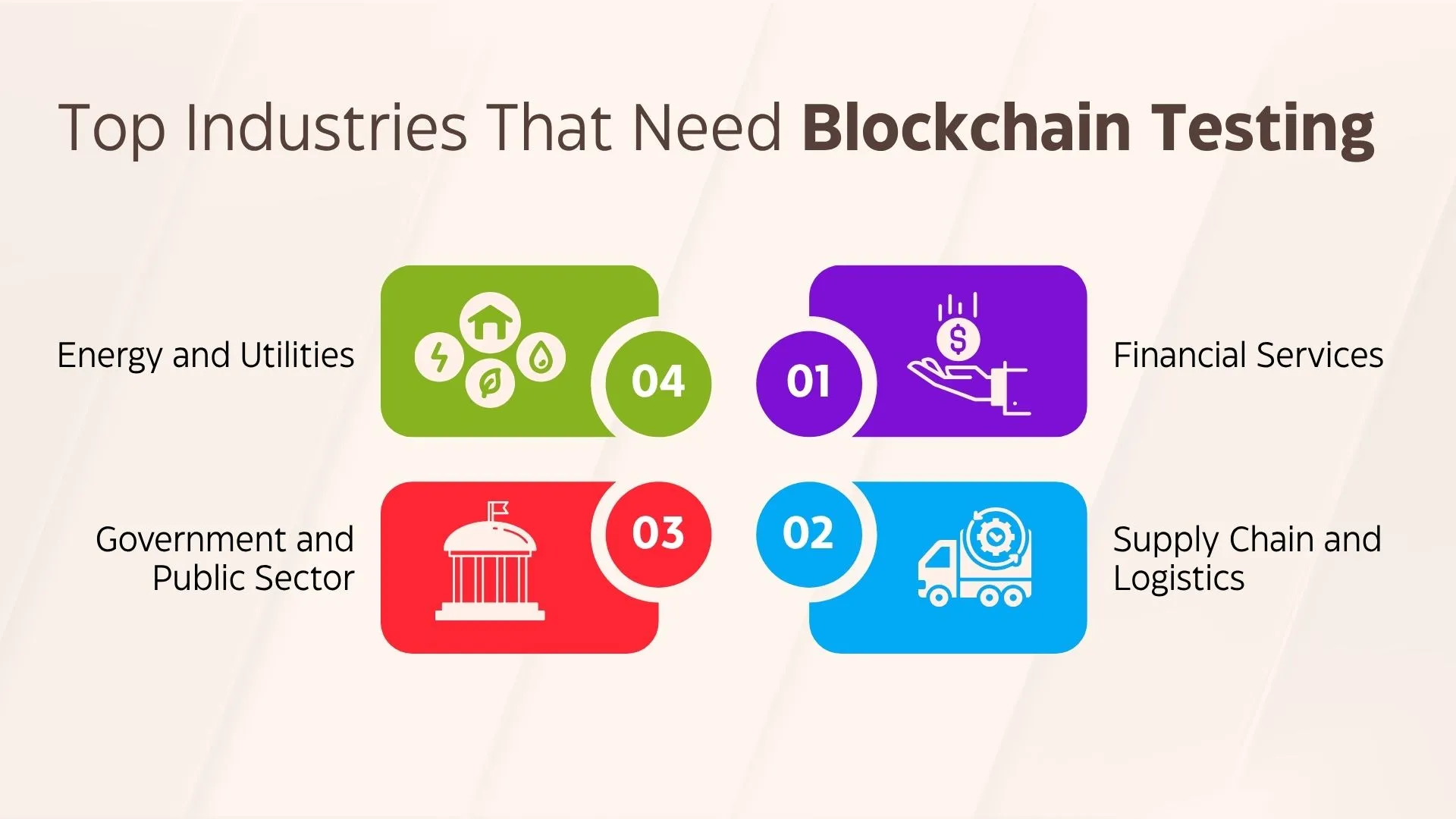
- Quick Access to Software Testing Services: Local teams offer faster onboarding, customized support, and a better understanding of regional compliance standards.
- In-Person Collaboration: Enables direct interaction with QA testers, enhancing communication for real-time feedback and agile iterations.
- Knowledge of Regulatory Compliance: NYC-based testers are well-versed in financial and legal frameworks, crucial for fintech and blockchain startups.
- Faster Deployment & Fixes: Geographical proximity helps minimize downtime during software penetration testing and accelerates production pushes.
- Access to Advanced Security Testing Tools: NYC firms leverage cutting-edge blockchain QA stacks like Foundry, Tenderly, and Manticore for enhanced security and performance testing.
Final Thoughts on Blockchain Testing Services in NYC
Blockchain testing in NYC has evolved into a specialized domain where precision, innovation, and security converge. From functional testing of smart contracts to software penetration testing for robust security assurance, local QA teams bring deep expertise tailored to the unique demands of decentralized applications.
With the integration of advanced security testing tools and performance testing strategies, blockchain networks can scale reliably while staying protected against evolving cyber threats.
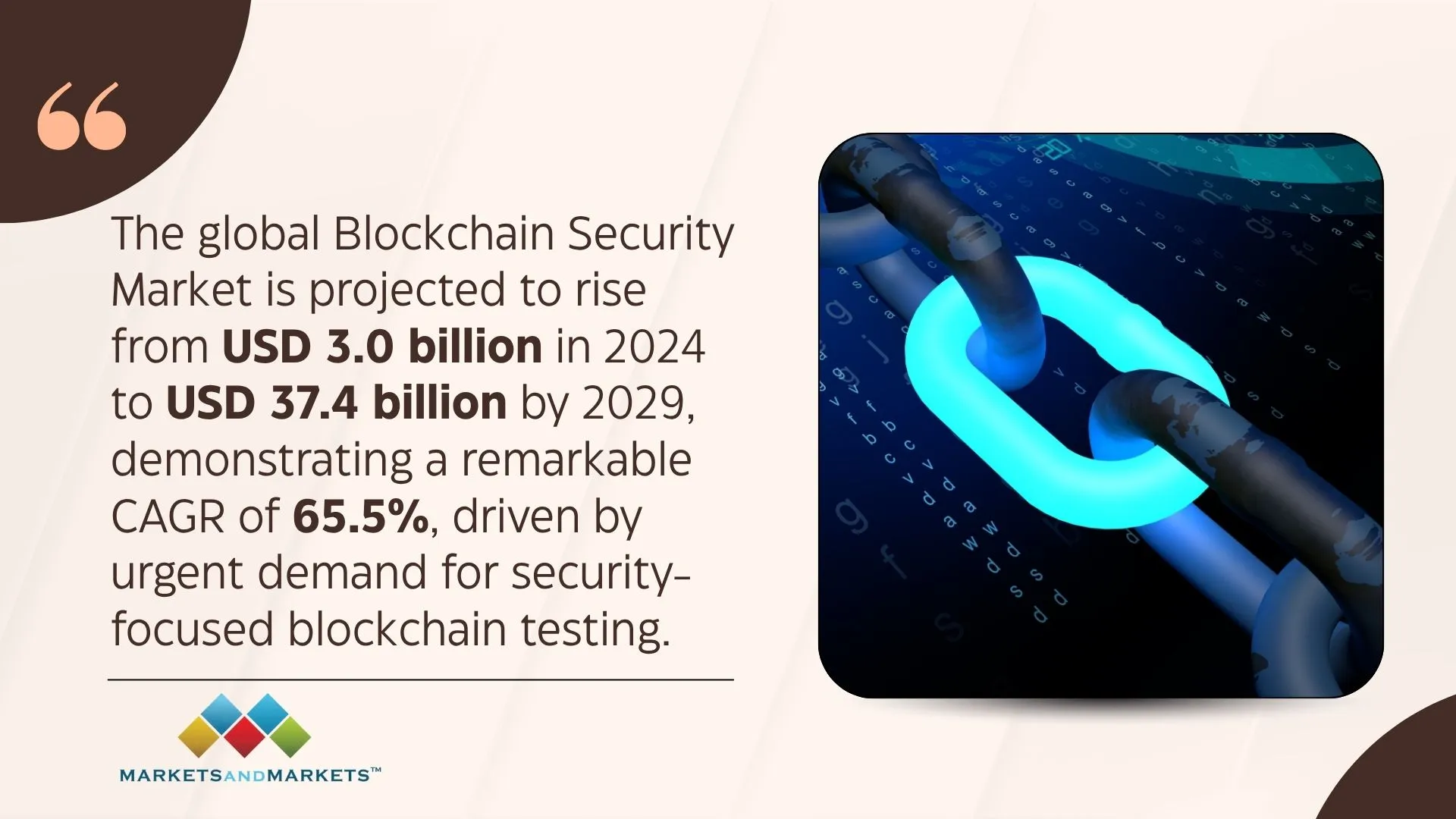
Top blockchain testing companies in New York, like Frugal Testing, Unicsoft, Peiko, Infuy, and Encyphers, offer comprehensive software testing services that ensure your blockchain solutions are audit-ready and future-proof. Leveraging local talent, regulatory insight, and cutting-edge toolsets, businesses gain a competitive advantage in launching trusted blockchain platforms.
Frugal Testing, a leading software testing company in Hyderabad, offers functional testing services, RPA testing services, and AI-driven test automation services. Known for FrugalTesting.com and frugal product services, they are a top choice among QA testing companies and SaaS application testing companies in the USA, ensuring scalable, secure digital transformation.
People Also Ask
1. How do blockchain testing services ensure regulatory compliance?
Blockchain testing services validate protocols against local and international standards to ensure smart contracts, data storage, and transaction flows meet regulatory compliance requirements.
2. How does blockchain testing impact network scalability planning?
Thorough blockchain testing uncovers bottlenecks and helps plan infrastructure that scales securely under heavy loads and growing network demands.
3. Is there a difference between public and private blockchain testing approaches?
Yes, public blockchain testing emphasizes decentralization and security, while private testing focuses on access control, speed, and enterprise-specific integrations.
4. What role does test automation play in blockchain validation?
Test automation accelerates smart contract testing, regression checks, and helps continuously validate chain performance with fewer manual errors.
5. What KPIs should businesses track during blockchain testing engagements?
Businesses should track KPIs like transaction speed, test coverage, gas efficiency, failure rate, and security vulnerabilities during testing phases.



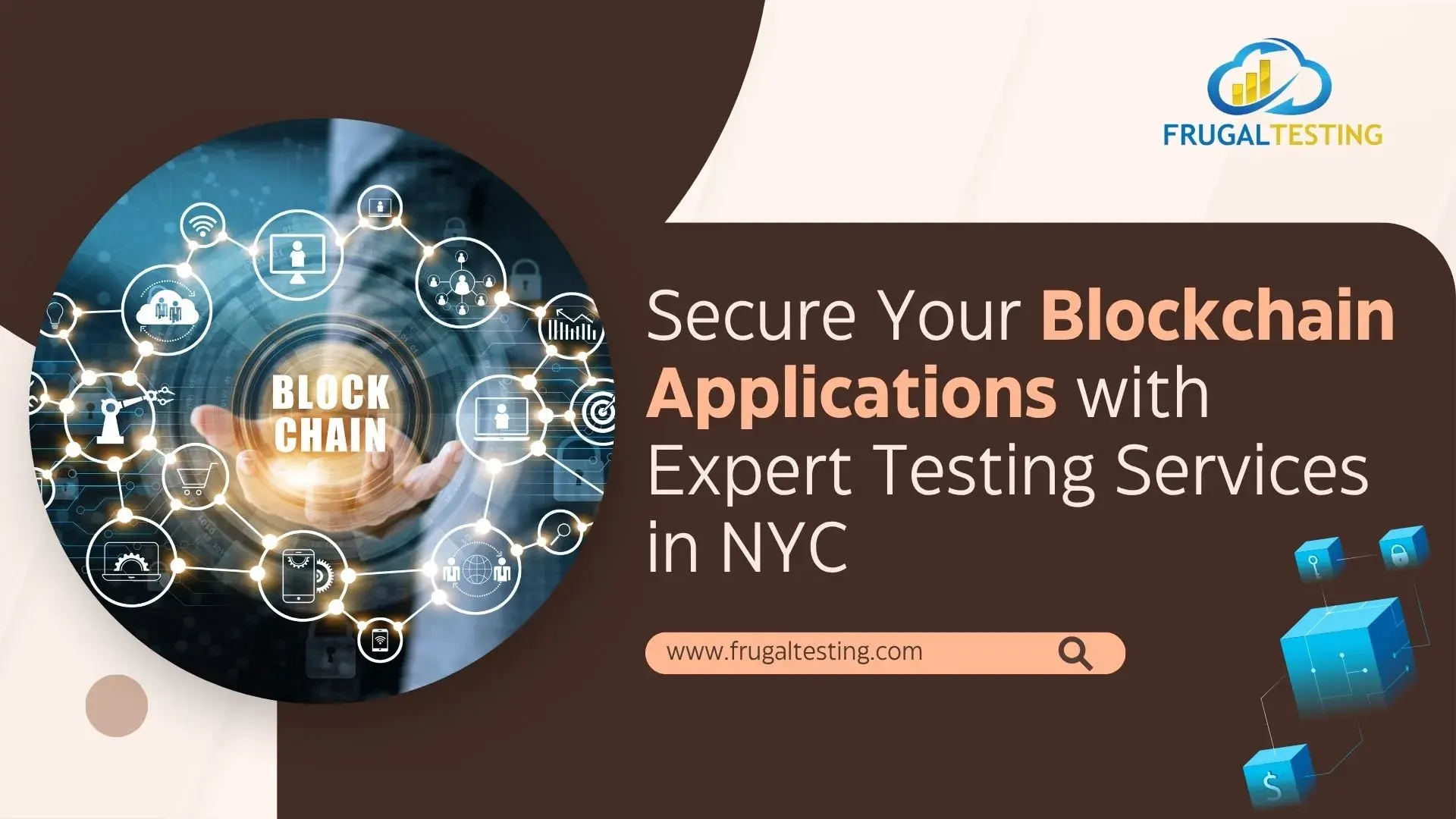
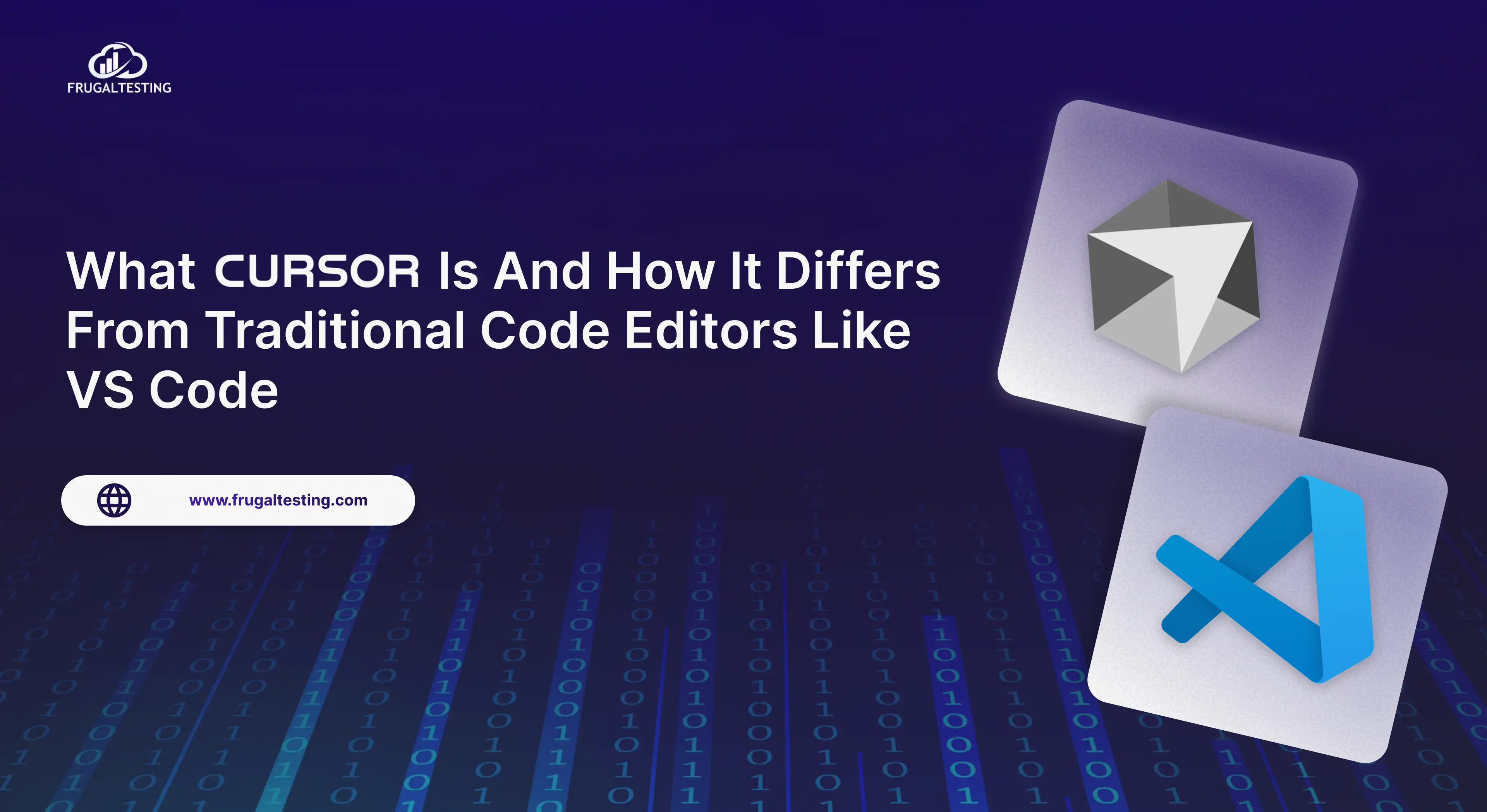
%201.webp)
